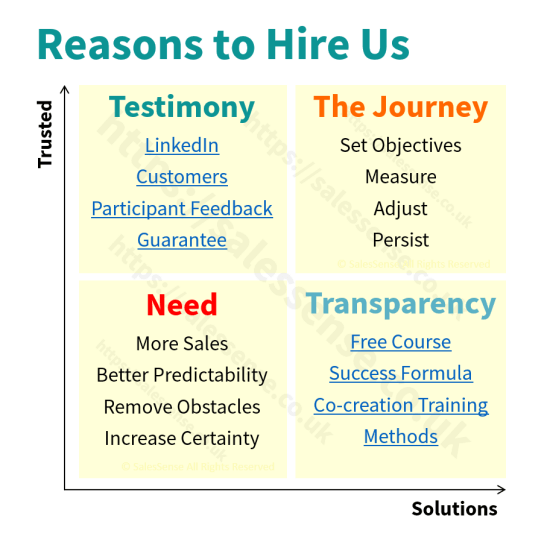Elements of essential sales training for B2B salespeople and teams.

Sales training is an essential component for the success of any B2B sales team. A well-designed sales training program can drastically improve the overall performance of your sales organisation, leading to increased revenue and customer satisfaction.
In this article, we will discuss various aspects of sales training that are critical for B2B sales teams. These include understanding the market; potential customers; the seller's organisation; written and verbal communication skills; the importance of qualification; the necessity of prospecting; self-management; planning; the use of processes, and continuous improvement.
Understanding the Market and Potential Customers
Effective sales training must emphasize the importance of understanding the market and potential customers. Sales professionals with knowledge about the industries they serve, market trends, and the needs and pain points of potential customers, sell more. This understanding enables them to identify opportunities, position their products and services effectively, and build strong relationships with prospects.
Knowing the Seller's Organisation
Sales training should provide insights into the seller's organisation, its products, services, and unique value propositions. Salespeople must understand their company's competitive advantages and be able to articulate them to prospective clients. This knowledge helps them to confidently represent their organisation and build trust with customers.
Written and Verbal Communication Skills
Effective communication is crucial in B2B sales. Sales training should include modules that help salespeople develop their written and verbal communication skills. They must learn to tailor their communication style to different audiences, clearly convey their ideas, and listen actively to address customer needs.
Sales Training for Qualification
There are three often unanswered sales qualification questions. They are:
- Will anything be bought? More than half of all business buying intentions do not result in the purchase of anything.
- Do we have a realistic chance of winning? IBM research highlighted the stark contrast between sales won when the answer was, 'yes' and sales won when the answer was 'no'. The numbers were 9/10 and 1/10 respectively.
- If they do buy, will it be worthwhile? Many sales turn out to be unprofitable because of customer dissatisfaction, misaligned expectations, underestimated costs of the sales campaign, and many other reasons.
These questions are not easy to answer.
Sales training should stress the significance of qualifying leads. Salespeople must learn to identify genuine opportunities and avoid spending valuable time on prospects that are unlikely to buy, can't be won, or wouldn't be worthwhile. Qualification techniques help sales professionals prioritise their efforts, manage their pipeline efficiently, and focus on deals with the highest probability of success. This is a topic that warrants continuous attention.
The Sales Prospecting Necessity
I often ask salespeople if they get enough leads from marketing to achieve their sales target. I have never had anyone answer, yes. Those who don't fill the gap through their own efforts are destined to miss their sales target.
Sales training must cover prospecting. It is a fundamental aspect of B2B sales. Sales professionals need to learn how to identify and engage with potential clients, using a variety of techniques such as cold calling, email campaigns, social media, and networking. Prospecting is essential for maintaining a healthy pipeline and ensuring continuous revenue growth.
Self-Management and Planning
Effective self-management and planning are vital abilities for sales success. Sales training should teach salespeople how to set goals, manage their time efficiently, and prioritize tasks. By learning to balance their workload and maintain focus, sales professionals can increase their productivity and achieve better results.
Use of Sales Process
Sales training must teach methods and processes based on proven best practices. Only by using a process consistently and measuring the results, can salespeople and their managers recognise opportunities to improve. And the more complex the sale, in terms of value and what is being sold, the greater the importance of the process. By understanding and following a structured sales process, sales professionals can manage deals more effectively, forecast accurately, and close deals faster.
Sales Training for Continuous Improvement
Annual training can be motivating but as a means of improving sales habits and practices, it is useless unless it is accompanied by an implementation plan that is actually executed. If you are not getting better at least as fast as your competitors, your sales performance in terms of market share will inevitably decline.
Some form of intervention that focuses attention on ways to improve should be a weekly or at least bi-weekly event. At the very least, dedicate an hour or two of the monthly sales meeting to improvement initiatives.
Kaizen is a Japanese word for continuous improvement. The approach was introduced to Japanese manufacturers by W. Edwards Deming. Starting in 1950 and in subsequent trips to Japan - 27 trips in all - Deming taught the Japanese his management philosophy which eventually came to be called the System of Profound Knowledge. This work has widely been cited as a key reason for Japan's rise as an economic world power on the international stage.
Conclusion
Sales training is an invaluable investment for B2B sales teams. By focusing on key aspects such as market understanding, customer knowledge, communication skills, qualification, prospecting, self-management, planning, use of process, and continuous improvement sales teams can significantly increase their performance and continually drive revenue growth. Invest in comprehensive and sustained sales training today and watch your sales organisation flourish.
Article by Clive Miller
If you know what you need and want a sales trainer to deliver it, or want sales training needs to be assessed and a programme recommended, we can help. Telephone +44 (0)1392 851500. We will be pleased to learn about your needs and discuss the options. Send an e-mail to jimm@salessense.co.uk, use the contact form here, or book a call with Clive Miller.












